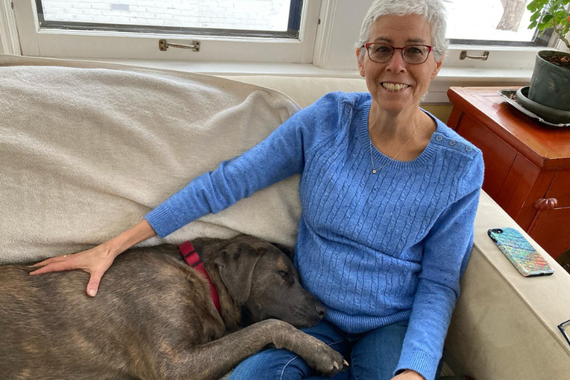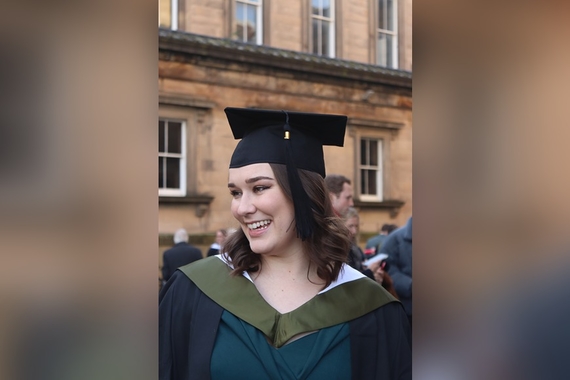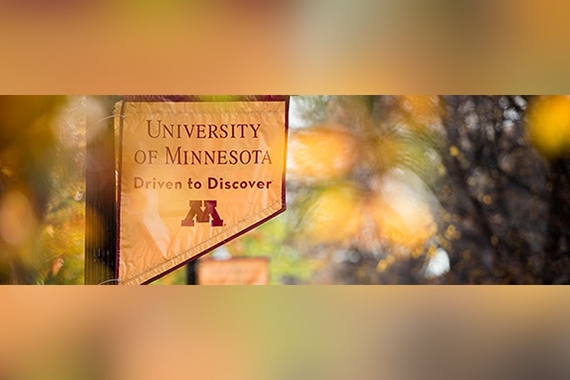Curiosity Opens Up the World
Alum Leila Hussain (BA ‘18, global studies major and Arabic minor) shares how her time at the Institute for Global Studies helped her find her ideal career after graduation. With a concentration on human rights and justice in the Middle East, she reflects on how her diverse coursework and experiences studying abroad in Oman and Berlin led her to a fulfilling career working with US immigrants.
What drew you to global studies at the University of Minnesota?
I came to the University of Minnesota not knowing what I wanted to do, but I was curious about the world and curious about the social issues that we face. I wanted to explore my interests. I went to a smaller university for my first two years, actually, and I felt like I was getting a good education, but that my opportunities were limited. The depth and the nuance in my classes were also limited, and I wanted to study abroad. I wanted to get global experience outside of Minnesota, outside of the United States.
I ended up on the University’s Institute for Global Studies website and was really excited about the topics and courses. I love learning about human migration, human rights, and justice. I got really interested in global studies because of all of the opportunities that it provided for me to expand my awareness of the world and understanding of the social issues that we face today and how I can be a small part in finding solutions.
What are some of the ways IGS stands out at the University?
I think the most unique thing that stood out to me was the size. It's a small, intimate program, so I got to know all of my peers really well. For example, we had a graduation party just for the global studies students, and I was part of the Global Studies Student Association. It felt like a really tight-knit community with like-minded people. I just feel like I clicked really well with my classmates.
Another thing that's unique and special about global studies is that all of our professors or faculty actually have a specialty in another department. I think Global Studies is intentional about bringing expertise from all of these different departments to global issues. For example, I learned about the Israeli-Palestinian conflict from an anthropology professor. I took a global women's health class from a public health professor and a social movements class from an English professor.
The nuance that you get from attending a class with someone with so much expertise in that background is unmatched. Global Studies does a really good job of curating the classes, so you really get this holistic perspective of the world through all those different lenses.
How has the opportunity IGS offers to study abroad influenced your education?
Through my studies at the University of Minnesota—and through global studies specifically—I was able to get two scholarships that allowed me to study Arabic in Oman and migration in Berlin, one being the Critical Language Scholarship. I first heard about it through my academic advisor, who sent out weekly newsletters with opportunities for funding and events. As someone who would always seek these opportunities out, I reached out to the staff and advisors at the Institute for Global Studies, and they were so eager to assist me.
I got to experience so much while studying abroad in Oman. I was there during Ramadan and had the best time being totally immersed in the language, advancing in a way that I could never have in the US. It was three semesters worth of Arabic learning in one summer. Super intensive, but also just very eye-opening for me. The funding for studying abroad and the opportunity to be involved in student groups really shaped my experience in college.
Being thrown into another culture for some time changed the trajectory of my life. I really started to commit my life to working with immigrants and working with folks who have been disadvantaged in any way economically and socially and helping to empower them. I think in terms of having the opportunity to study a language that's meaningful to me and to study abroad, it opened my eyes and opened up my world.
How is IGS preparing students beyond college?
Most of the classes in Global Studies prepare us to understand systems and processes on a global level that are impacting us as people. That's at a macro level, but I think we're also getting that kind of hands-on experience through community engagement, and through studying abroad.
That on-the-ground focus helps us contextualize what we're learning, and even before I graduated, it helped me understand how to work with people. How to just get experience working in a nonprofit, for example, and getting leadership skills in the student association. I already had connections established when I graduated, and I felt like I had a really strong network thanks to my professors and my peers. I was able to jump into my path after Global Studies because they did a really good job just preparing me for my career.
Why does research matter in global studies for undergraduate students?
In my final year, I took a capstone undergraduate research class that was really wide open. Within the major, there are all these different kinds of paths that you can take, like migration, human rights, justice, and the global economy. Even within that, you can choose any topic that has really sparked your interest. For me, I took a class on the Israeli-Palestinian conflict. I had no idea that the American government had a huge role in it and I was so enlightened by that class. I wanted to run with that topic but get more specific on the topic of water and bring in the ecological perspective. My thesis title was “Water as a Tool For Power in the Israeli-Occupied Palestinian Territories”.
Because they give you the opportunity to do such intensive research as an undergrad, it gives you these really tangible skills in reading and writing. I became an excellent writer—I still use those writing skills in my career today and I get complimented on that a lot. I think the research was a really neat opportunity to just dive into something that I was interested in. No matter what topic you chose, as long as it was meaningful to you and meaningful to your studies, then there was full support from the faculty on that.
Global Studies also hosts an undergraduate research conference, giving students the opportunity to present and give panels on their research. It was really cool to participate in it because I got to challenge my public speaking skills and present to a large audience about the research. That was something that developed my leadership skills and developed me as a person, but then also raised awareness about what's happening in the Israeli occupation for my peers, my friends, and my family. It's very empowering and also shares information that's really important with the public.
What have you been doing beyond college?
Since graduation, I’ve gotten a lot of international experience studying and working abroad. It really opened my eyes to what it's like to be new somewhere. The last four years of my career, I've been really focused on empowering immigrant communities. Because of my experience in Iraq, I came back and started working at CAPI, which is an immigrant opportunity center. I was a navigator there and got to work directly with participants and community members to help them navigate benefit systems.
Then, through that opportunity, I was able to grow and eventually landed a leadership position at CAPI overseeing the resettlement effort of the most recent wave of Afghan refugees. I had studied human rights and justice and migration in Global Studies, and I saw those topics in action with this emergency evacuation that happened last year (2022). Also, working directly with families was really impactful, and was really a huge point in my career.
As of now, I just started a new position in February as an outreach coordinator at Twin Cities Rise, a nonprofit that supports people in finding meaningful employment. A lot of folks who go through our program have been incarcerated, have dealt with chemical dependency, or are just looking for a shift in their career.
Our focus is on eight-week-long career-training programs, preparing someone to get meaningful employment. The coolest part about it is our focus on personal empowerment, focusing on empowering you as an individual and developing your emotional intelligence. Not just career development, but personal development.
I work as an outreach coordinator there, which means I'm on the ground a lot. I'm at community events, I'm tabling, I do all of the admissions for the actual program and talk to people about the program to recruit for it.
Your advice for future students?
When I chose global studies [for my major], I thought to myself that it was a really broad degree. I could do a lot with it and had a hard time understanding what my life could look like after graduation and what jobs I could potentially get. The best advice I could have given to myself at that time was that it doesn't matter—just jump into what's interesting to you, and it will lead to the next.
But specifically for me, it led to international travel, led to working at an immigrant opportunity center and working directly with clients, and then led to a leadership opportunity and then back to community work. I think I've been able to explore a lot of different types of work, and I think that that's important to know when you're young and you're looking into questions like: Where exactly will this lead me? What exact job title will I get with this degree?
I think that's kind of the special part of global studies. There isn't one exact path that it's going to lead you down. But for me, it's led me down a really beautiful path of just exploring my interests and my impact in my community.
Career Ready
As an American studies student, you will develop ten core competencies to prepare you for your future career, including:
Develop a consciousness about your potential contributions and roles in the many communities you inhabit, in person and online, and take action accordingly.
- Actively engage with the communities in which you are involved.
- Build awareness of how communities impact individuals, and how, in turn, an individual impacts, serves, and shapes communities.
- Evolve your awareness of culture and power in community dynamics.
Explore possible careers, gain meaningful experience, and build skills that help you excel after college and lead to employment or other successful post-graduation outcomes.
- Understand your values, interests, identity, personality, skills, strengths, and Core Career Competencies
- Articulate how those characteristics, combined with and shaped by a liberal arts education, lead to career success
Cultivate awareness of your own identity and cultural background and that of others through an exploration of domains of diversity, which may include: race, ethnicity, country of origin, sexual orientation, ability, class, gender, age, spirituality, etc. This requires an understanding of historical and social contexts and a willingness to confront perspectives of dominant cultural narratives and ideologies, locally, nationally, or globally.
- Understand how culture affects perceptions, attitudes, values, and behaviors
- Recognize how social structures and systems create and perpetuate inequities, resulting in social and economic marginalization and limited opportunities
- Commit to the fundamental principles of freedom of thought and expression, equality, respect for others, diversity, and social justice; and to participate in society as conscious global citizens
- Navigate an increasingly complex and diverse world by appreciating and adopting multiple cultural perspectives or worldviews
This story was edited by Lily Zenner, a CLA student.


